UN Meet Focuses on Global Digital Identity Framework

UN Secretary-General António Guterres addressed the event "Digital Identity in the Era of AI" held by the World Digital Technology Academy on September 21. (SCREENSHOT)
Creating a global digital identity framework is a pressing need today as AI develops rapidly. On September 21, the event "Digital Identity in the Era of AI" was held by the World Digital Technology Academy (WDTA). It is a part of the UN Summit of the Future, the highest-level event in the history of the UN.
To ensure the safety, trustworthiness, and responsible use of AI technology globally, the WDTA launched the "AI Safety, Trust, and Responsibility" (AI STR) certification program, which establishes international standards to ensure that AI systems adhere to the highest safety and ethical standards in all stages of design, development, and application.
The WDTA also released three standards: the "Generative AI application security testing and validation standard," "Large language model security testing method," and "Large language model security requirements for supply chains”.
Philemon Yang, president of the UN General Assembly, underscored the necessity of international cooperation to navigate the ongoing technological revolution.
UN Secretary-General António Guterres said the UN 2.0 would have a strong digital focus, highlighting the need for global digital solutions as AI reshapes the future.
Peter Major, founding chairman of the WDTA and the Hungarian representative, emphasized the significance of the event in shaping a comprehensive global digital identity strategy that would bridge the gap between digital and physical identities.
Gambian Ambassador Muhammadou Kah, who is also chairman of the UN Commission on Science and Technology for Development, brought a perspective from the Global South, calling for a unified strategy to ensure that AI advancements benefit developing nations equally.
Siddharth Chatterjee, the UN resident coordinator in China, called on the international community to strengthen cooperation, build a secure and inclusive digital identity system through international cooperation, promote the responsible application of technology, and protect human rights and privacy.
C.C. Chan, an academician of the Chinese Academy of Engineering, said we can create a balance between technology and ethics by building a globally unified digital identity framework and promoting the development of AI standard systems. This will ensure that technology serves the well-being of all.
In his keynote address, Yale Li, executive chairman of the WDTA, outlined the critical need for a global digital identity framework that prioritizes privacy, security, and seamless integration in an AI-driven world. Li advocated the UN 2.0 to adopt a comprehensive UN identity strategy, ensuring that digital identities are governed ethically and inclusively on a global scale.
Xu Ting, vice chairman of the WDTA, announced the official renaming of the WDTA's Chinese name, emphasizing the integration and development of science and technology, engineering, and projects to reflect its vision and mission of promoting academic research, talent cultivation, and international cooperation in digital technology.
Gary Marcus, a New York University professor, pointed out the existing flaws and potential risks of current AI. He emphasized the need for policy intervention, transparency, independent oversight, and the development of global AI standards to ensure the responsible use of AI technology and mitigate long-term risks.
The establishment of the WDTA's Americas headquarters was also announced at the event. Additionally, the U.S. branch of the International Academicians Science and Technology Innovation Center was inaugurated to strengthen collaboration between academia, technology, and international governance.






